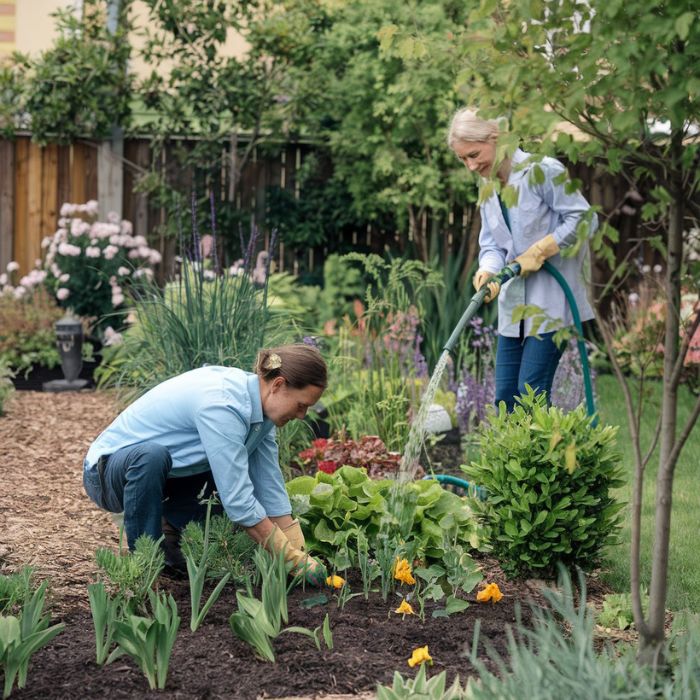The Land Gardeners: A Sustainable Approach to Organic Gardening
Organic gardening has gained tremendous popularity in recent years as more individuals seek to grow their own plants, fruits, and vegetables while minimizing the impact on the environment. Among the various advocates of this practice, The Land Gardeners stand out for their unique, sustainable approach to organic gardening. This article delves deep into the principles and practices of The Land Gardeners, offering a comprehensive guide for those looking to embrace nature-friendly gardening.
Who Are The Land Gardeners?
The Land Gardeners, a creative collaboration between Henrietta Courtauld and Bridget Elworthy, is a well-known gardening consultancy based in the UK. They are renowned for promoting organic, sustainable gardening methods that not only enhance plant growth but also help nurture the environment. Their philosophy revolves around soil health, biodiversity, and community engagement. Henrietta and Bridget emphasize the importance of using compost and natural materials to feed the soil, creating thriving ecosystems that support plant and human well-being.
Their expertise is also shared through workshops, books, and consultations, helping amateur and experienced gardeners alike to adopt earth-friendly gardening techniques.
The Core Principles of The Land Gardeners
1. Soil Health is Everything
The Land Gardeners firmly believe that the foundation of any successful garden is healthy soil. Healthy soil provides the nutrients necessary for plants to grow strong and resilient. It also aids in water retention, helps prevent erosion, and supports a vast array of beneficial microorganisms.
Key Practices for Healthy Soil:
- Composting: One of the cornerstones of The Land Gardeners’ approach is the creation and use of high-quality compost. Compost enriches the soil by returning nutrients and organic matter, creating a healthy environment for plants.
- Mulching: The Land Gardeners often use mulching to suppress weeds, retain moisture, and further enrich the soil. Natural materials like wood chips, straw, and compost are often used as mulch.
- No-Till Gardening: By avoiding tilling the soil, The Land Gardeners prevent the destruction of soil structure and maintain the biodiversity of beneficial organisms.
2. Biodiversity is Key
A garden isn’t just about plants; it’s a thriving ecosystem. The Land Gardeners focus on planting a wide variety of flowers, vegetables, and shrubs that attract beneficial insects and animals. This biodiversity helps with natural pest control and improves the overall health of the garden.
How to Increase Biodiversity in Your Garden:
- Plant a Variety of Species: Include native plants, perennial herbs, and different vegetable species in your garden. This variety attracts pollinators such as bees and butterflies, which are vital for plant reproduction.
- Create Habitats: Piles of logs, rocks, and wild patches can offer shelter to helpful insects, birds, and small animals. The Land Gardeners advocate for creating welcoming environments for wildlife.
- Avoid Pesticides: Harmful chemicals can destroy the delicate balance of your garden’s ecosystem. Instead, The Land Gardeners recommend organic solutions like companion planting to manage pests.
3. Water Conservation
Water is a precious resource, and The Land Gardeners emphasize the importance of conserving it. With unpredictable weather patterns and increasingly dry conditions, proper water management is crucial.
Water-Saving Techniques:
- Rainwater Harvesting: Collecting rainwater is one of the easiest and most eco-friendly ways to water your garden. The Land Gardeners suggest setting up rain barrels or other collection systems.
- Drip Irrigation: Instead of using a traditional sprinkler system, The Land Gardeners recommend drip irrigation, which delivers water directly to the roots of the plants, minimizing waste.
- Mulching for Water Retention: Mulching doesn’t only improve soil health—it also helps retain moisture, reducing the need for frequent watering.
4. Community and Knowledge Sharing
The Land Gardeners strongly encourage community involvement in gardening. Gardening is not just a solitary endeavor but can be a communal activity that fosters knowledge sharing and collective environmental responsibility. Through workshops, garden tours, and collaborations with local organizations, The Land Gardeners seek to build a network of like-minded individuals dedicated to sustainable gardening.
How to Build a Garden Community:
- Join Local Gardening Groups: Sharing ideas, seeds, and plants with fellow gardeners enriches your experience and opens up opportunities for learning.
- Host Garden Tours: Invite neighbors and friends to tour your garden and exchange gardening tips.
- Participate in Workshops: Attend gardening workshops to learn new skills, exchange knowledge, and contribute to a community-based approach to sustainability.
Getting Started with The Land Gardeners’ Methods
If you’re new to gardening or want to shift toward a more sustainable approach, following The Land Gardeners’ principles is a great way to begin. Here’s a simple guide to getting started:
Step 1: Prepare Your Soil
Start by testing your soil to understand its composition. You can purchase a simple soil test kit to measure its pH level, nutrient content, and texture. Once you know what your soil needs, begin adding organic materials like compost to improve its health.
Step 2: Plan for Biodiversity
Draw a layout of your garden and decide what varieties of plants you want to grow. Include a mix of flowering plants, herbs, and vegetables. Make sure to choose plants that are suitable for your climate and soil conditions.
Step 3: Start Composting
Composting is essential to enriching your soil. Create a compost bin and start collecting kitchen scraps like fruit peels, coffee grounds, and eggshells. Over time, these materials will break down and become nutrient-rich compost.
Step 4: Implement Water-Saving Measures
Set up a rainwater collection system to reduce your reliance on municipal water. If you’re unsure about installing a drip irrigation system, you can start by hand-watering in the early morning or late evening to reduce evaporation.
Step 5: Grow and Share
As your garden grows, share your success with others. Whether you’re trading plants or offering gardening advice, building a community of fellow gardeners enriches the experience for everyone.
The Land Gardeners’ Legacy
The Land Gardeners continue to inspire countless individuals to pursue sustainable gardening. Through their efforts to prioritize soil health, biodiversity, and community involvement, Henrietta Courtauld and Bridget Elworthy have shown that organic gardening is not only good for the earth but also deeply fulfilling.
Their workshops, books, and consultations have left a lasting impact on how we approach growing food and maintaining landscapes. If you’re eager to transform your garden into a sustainable haven, following The Land Gardeners’ methods is a fantastic way to start.

